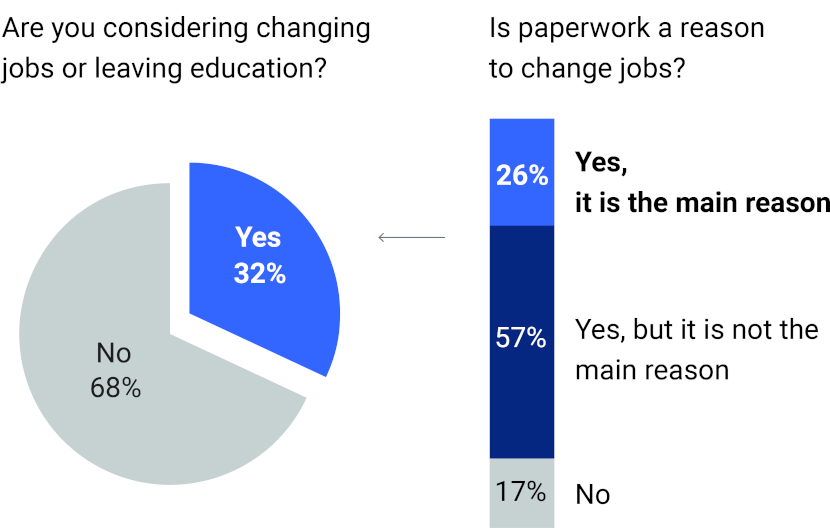Primary school teachers spend nearly a day a week on paperwork
Primary school teachers spend between 6 and 8 hours a week on paperwork. A third of the teachers are considering alternative employment. The administrative burden is the main reason for more than a quarter of them. These findings are presented in a Netherlands Court of Audit report, ‘How long should it take?’, on the administrative burden in primary education.
On average, teachers in full-time employment spend 6 to 8 hours a week on paperwork, with peaks at several moments in the year. Paperwork takes up more time in the Netherlands than in other countries. Teachers in the United Kingdom, Belgium and Australia spend just over 4 hours a week on paperwork. Many Dutch primary teachers say they cannot complete all the work during school hours and have to finish it off in their own time. A third of all teachers say they are considering changing jobs. More than 80% of them say administrative work is one of the reasons; a quarter say it is the most important one.
Many teachers considering changing jobs because of the administrative burden

15 minutes extra per special needs pupil per week
The average of 6 to 8 hours a week does not tell the whole story. There are significant differences among teachers, mainly because of the composition of their classes. On average, a primary teacher spends an additional 15 minutes a week on every pupil with special needs in order to plan, coordinate and evaluate the support provided. 13% of the teachers have more than 8 special needs pupils.
More special needs pupils, more time spent on paperwork

Teachers understand the reasons, but how long should it take?
Teachers understand why paperwork has to be done for all their important administrative tasks, and often agree with the reasons. Paperwork helps them inform parents, the inspectorate and school managers correctly. It also helps them give pupils the assistance they need. The question is whether the benefits of paperwork outweigh the time it costs. That time can only be spent once. Other important tasks, such as assisting children, might be neglected.
Scrapping government rules will not necessarily help
A common political solution to cut red tape is to identify administrative tasks that can be scrapped. But this will not necessarily help. The legal requirements on teachers’ administrative tasks are already few and far between. Furthermore, there is no guarantee that scrapping rules will actually eliminate the administrative burden. Teachers have not had to make pupil development plans, for instance, for many years but nearly all the schools we audited are still making them because they have always made them.
State secretary could better assess the costs and benefits…
There are no simple solutions to reduce the administrative burden on teachers. Several parties, however, have a part to play. The state secretary could make a realistic estimate of the paperwork that is the outcome of government measures and provide guidance on how it should be done. Paperwork due to the policies taken by schools and school managers should also be assessed.
The state secretary should make a more careful assessment of a measure’s benefits and its resultant administrative burden. The state secretary could work with the Inspectorate of Education to clarify what paperwork is unnecessary and share examples of how paperwork can be completed more efficiently.
… and so can schools
There are significant differences, both from teacher to teacher and from school to school. Schools themselves could do a lot more. Like the state secretary, they could better assess the costs and benefits of paperwork. Teachers are pressed for time. Schools should therefore make clear choices on the paperwork teachers should and should not do. This would prevent teachers doing paperwork ‘just in case’. School managers can help by deciding what paperwork is actually worth the trouble. They could also share best practices and encourage schools to learn from each other.
The Court of Audit’s Board member Barbara Joziasse thinks a lot can be gained from a smart reduction in the administrative burden, ‘If the state secretary and the schools free up 1 hour per teacher per week, 2,250 FTE would be released for other tasks, which would improve the education and assistance provided to pupils. This is possible if they dare to take critical decisions on how teachers can best spend their time.’